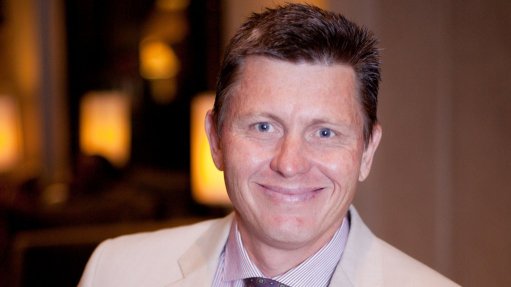
MARK SCHAPERS JG Afrika’s systematic approach is transferred to all activities involved in completing groundwater projects
South African consulting and engineering firm JG Afrika is working hard to change the mindset around using South Africa’s groundwater to mitigate water scarcity, despite project failures in the past.
JG Afrika technical director Mark Schapers and JG Afrika executive associate Regan Rose agree that failures can mainly be attributed to the limited manner in which groundwater initiatives are implemented, compounded by the abuse of the groundwater resource in the operation and maintenance phase.
These projects provide a cost- effective alternative to pumping water from other sources of supply. In addition, groundwater is a more resilient to evaporation than surface water, and is three orders of magnitude more abundant than fresh surface water sources on the planet.
“Numerous unsuccessful groundwater projects have fuelled doubt around the suitability of groundwater initiatives as long-term water supply solutions and significant effort from all reputable players in the groundwater fraternity will be needed to alleviate doubt. This is why it is so important that any existing and future-related groundwater initiatives be implemented in a professional manner to ensure their continued support,” says Rose.
There are, however, many government projects that continue to successfully demonstrate the larger, standalone role that groundwater will be able to play in future water systems. Alternatively, groundwater can be used to bolster or alleviate pressure on existing supply infrastructure.
Rose gives the example of having worked closely with a municipality since 2012 to aid it in developing its own groundwater resources for watering sports complexes. “We are currently involved in a drought-relief programme where these sports fields’ watering sources are fast becoming an important alternative to running water at schools when water restrictions in the province intensify.”
This project complements a host of other JG Afrika projects, including the firm’s involvement as the professional geohydrologist for a large water and sanitation initiative for schools in rural areas of KwaZulu-Natal, another water-stressed South African region.
The project, implemented by the KwaZulu-Natal Department of Public Works on behalf of the province’s Department of Education, serves as a prime example of the integral role JG Afrika’s specialist skills play in making these initiatives a success.
Project sustainability is not a technical exercise alone. From the outset, JG Afrika’s geohydrologists focus on ensuring buy-in from beneficiaries and surrounding communities. JG Afrika’s team also consults with relevant councillors, Ndunas (headmen or officials) and headmasters, forming the basis of ongoing communication channels during and after the project’s implementation cycle.
JG Afrika asserts that this is a critical step in the process, and through the creation of ownership, one that seeks to establish a long-term outlook for the project while trying to create optimal use of the groundwater resource after handover. All JG Afrika sites are treated as business plans and a methodical approach is applied throughout, starting with thorough desktop studies and detailed planning of activities, through to the completion of comprehensive feasibility studies for clients.
In addition, reliable and recognised equipment is used in the geophysical-surveying phases of projects, ensuring accuracy and a high success rate of the infrastructure.
The firm’s systematic approach is transferred to all activities on site, ranging from drilling through to yield testing, the equipping of the boreholes, and on-site supervision thereof. “Great care is taken throughout, even in implementing strict measures to avoid contamination of the groundwater resources once they are exposed.”
JG Afrika’s many successful projects continue to demonstrate that government bodies and private-sector participants have a trusted partner with the necessary skills and capabilities to help bring the groundwater resource to surface.